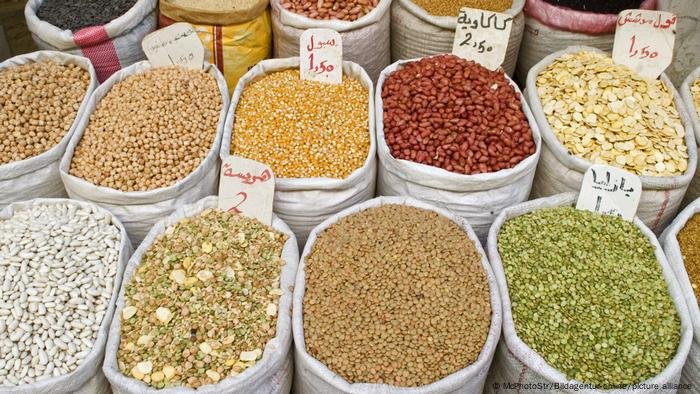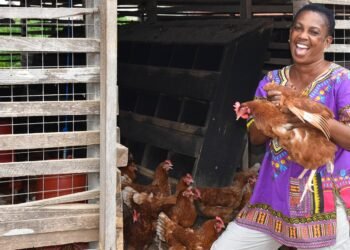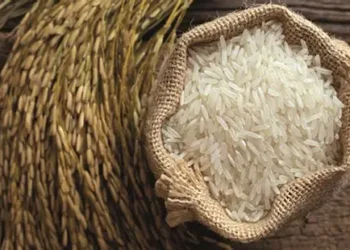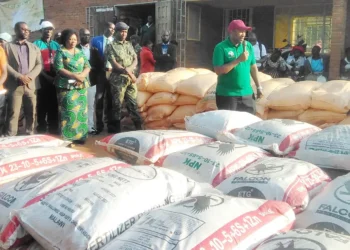The Majority Leader of Parliament, Hon. Mahama Ayariga announced that cabinet has approved funds to the National Food Buffer Stock Company (NAFCO) to purchase excess farm produce from farmers.
Hon. Ayariga made this comment on the floor of Parliament while responding to Hon. Nureedin Mohammed, Member of Parliament (MP) for Nalerigu Gambaga, who called for the Minister for Food and Agriculture (MoFA) to appear before Parliament to brief the House on the steps MoFA has taken to avert the looming food supply glut.
According to the Majority Leader, Cabinet had taken proactive steps to ensure that farmers did not suffer due to the abundance of their harvest.

“Funds have been approved to empower Ghana Buffer Stock to purchase excess grains and other farm produce, ensuring that farmers are supported and food reserves are strengthened.”
Hon. Mahama Ayariga, Majority Leader of Parliament
The funds approved to the Buffer Stock Company will empower the Company to absorb the surplus produce at an agreed price with farmers unlike the lower price farmers will sell to the public due to their inability to store or preserve harvested grains in large quantities. NAFCO’s purchase would include carry-over stocks from the precious seasons that farmers were able to store, the Majority Leader said.
He further reiterated that the Company’s mitigation of post-harvest losses will stabilize the agricultural economy and maintain a stable food inflation. He added that, this major fiscal intervention will provide immediate market to farmers after harvest, promote food security, boost food reserves, stabilize agricultural markets, protect farmer incomes, and stabilize prices in the face of excess supply.
Though Parliament and Ghanaians await the formal briefing of the Minister responsible for Food and Agriculture, the intervention by government, revealed by Hon. Ayariga, has been welcomed and hailed by farmers. The farmers express relief of avoiding further losses and that their efforts on the farms would not be in vain.

The government have also been praised by Agricultural advocacy groups for their reaction to the growing menace, noting that such measures are critical to sustaining the drive of Ghana’s agricultural transformation.
The leader, therefore, assured members of the House that the government remained committed to safeguarding and protecting the interests of farmers and ensuring that the bumper harvest translates into national prosperity.
Previous Bemoans of Ghanaians
A week ago, the Ministry of Food and Agriculture and the government came under intense pressure from Civil Society Groups, farmers, and Ghanaians. This pressure was warranted as rice farmers complain they are unable to sell their produce to NAFCO because the Company lacked the needed funds to purchase all farm produce. To avoid the grains from perishing and going bad, farmers had to reduce grain prices leading to financial losses.
Farmers associations like the Peasant Farmers Association called on the government to provide adequate funds needed for NAFCO to buy the excess rice grain from the farmers. This they pointed out; will reduce the losses the farmers are currently experiencing.

“There are still rice farmers struggling to find buyers because NAFCO doesn’t have the financial capacity to absorb all the rice in the system.
“If this situation continues, many farmers will stop producing rice because they know their investments could go to waste. We are calling on the government and the President to urgently allocate more resources to NAFCO. The current funding is woefully inadequate.”
Bismark Nortey, Acting Executive Director of Peasant Farmers Association of Ghana
The Nalerigu Gambaga MP, alongside other Members of Parliament and Ghanaians, added their voices to the cry of farmers.
According to Hon. Mohammed, the economic cost of post-harvest losses and the financial implication and stress on farmers over their excess produce, especially maize and rice, is unbearable.

Implication of NAFCO’s Funding
NAFCO can now purchase surplus maize and rice and this will balance demand and supply in the domestic food market while smoothening price volatility.
Economists believe the government’s decision would help them manage headline inflation, especially when inflation is mostly driven by food prices in recent times.
While the economic and social welfare of farmers are protected, the approved fund pumps money into the rural economy as ready cash is provided to farmers in exchange for their harvests. These farmers season-on-season struggle to find buyers to buy their produce at their profit-making price.

This lifeline the government has created, and is applauded by agribusiness stakeholders, if continued, would build a structured system for the grain market. The government’s move has encouraged agriculture stakeholders to have confident and be relentless in their participation in the government’s agricultural transformative initiatives.
NAFCO can now cushion supply shocks, providing food for the schools and other emergency reliefs such as the work of the National Disaster Management Organization (NADMO). The fiscal intervention by the government would also benefit the entire supply and value chain from logistics to processing, even till distribution.
READ ALSO: Ghana Set to Triple Road Infrastructure by 2047 – a Smarter Transport Network























